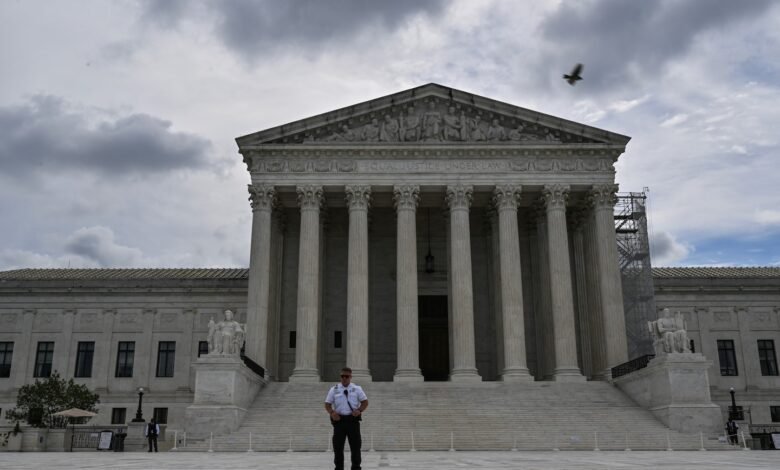The Supreme Court gives the right a big victory over expertise

The decision in Brilliant Loper reflects the court’s decision in 2022 Dobbs v. Jackson Women’s Health Organization decision that annulled Roe v. Wade. In both decisions, the court actively chose to reject decades-old precedent in the service of an outcome fervently sought by conservative and right-wing activists. In Dobbswas restricting access to abortion. In Brilliant Loperit was reducing the power of government agencies to implement laws.
At issue is the inevitable gap between laws as written and laws as implemented. Congress does not and cannot think about every eventuality when creating new rules, so the details are left to the agencies charged with implementing them. Under the 1984 Act Chevron vs. Natural Resources Defense Council decision, courts have deferred to these agencies when implementation was contested and Congressional intent was unclear. Bright Loper undo Chevronexplicitly.
“Chevronthe presumption is misplaced because agencies have no special jurisdiction to resolve legal ambiguities,” Chief Justice John G. Roberts Jr. wrote. Bright Lopermajority opinion. “The courts do. The authors anticipated that courts would often face legal ambiguities and expected courts to resolve them through the exercise of independent legal judgment.”
In her dissent, Justice Elena Kagan offered examples of how these “ambiguities” often play out in practice. When does an alpha-amino acid polymer qualify as a specific protein? How should the “distinct population segments” of certain endangered animal populations be determined? What constitutes “natural tranquility,” and when has that tranquility been “substantially restored”?
Kagan delved into the issue of endangered animals.
“Deciding when one squirrel population is ‘distinct’ from another (and therefore warrants protection) requires more knowledge about species than consulting a dictionary,” she wrote. “How much variation of what kind—geographic, genetic, morphological, or behavioral—should be required? A court could, if forced to, muddle through this issue and announce a result. But wouldn’t the Fish and Wildlife Service, with all its specialized expertise, do a better job of the task—of saying what, in the context of species protection, the open-ended term ‘distinct’ means?”
Answering such questions “does not primarily require the interpretive skills that courts possess,” she wrote elsewhere. “Rather, it requires one or more of: subject matter expertise, long engagement with a regulatory scheme, and policy choice.”
She chided most for assuming they knew better on these issues.
“A rule of judicial humility paves the way for a rule of judicial arrogance,” she wrote. She later added another scathing critique: “In one fell swoop, the majority today gives itself exclusive power over every open question—no matter how expertise-driven or policy-laden—surrounding the meaning of regulatory law.”
“As if they didn’t have enough to do,” Kagan continued, “the majority become the country’s administrative czar.”
The decision is undoubtedly a function of the business sympathies of the conservative majority. Repealing Chevron This means that companies frustrated by regulations don’t have to turn to scientists and bureaucrats, but can instead hire lawyers and talk to judges — where their chances of success are much greater, in part because judges they are not subject matter experts.
It is also, of course, a reflection of the right’s long-standing effort to undermine the power of the federal government. But that stands alongside the more politically salient factor, the fundamental rejection of expertise.
There are two important reasons why the right in particular has adopted an explicitly anti-expert worldview, shifting to the belief that anyone’s opinion is as good as anyone else’s.
The first is that the internet has facilitated an approach to knowledge rooted in what people dig up for themselves. This isn’t necessarily harmful, but in practice it means that people examine information less for edification than to look for what reinforces their existing beliefs. Why should we listen to infectious disease expert Anthony S. Fauci’s assessment of the coronavirus when this podcast says that horse deworming will solve the problem?
The other factor here is Donald Trump. Trump ran as the non-government guy, the guy who would root out the “deep state” that did things like evaluate how best to implement regulations. He was an outsider, someone untainted by the expertise of having held office or served in government. (This also leveraged the right’s hostility to government — which is, of course, intertwined with hostility to paying taxes.) Then Trump won, and he made hostility to government and expertise a hallmark of his administration. He’s the guy who made Fauci a target in the first place.
In 2022, YouGov asked Americans who the government should defer to if experts’ opinions on a complex issue disagreed with the majority view. A plurality of Democrats chose the experts. Republicans chose the Americans by a 2-to-1 margin.
If we have to choose between having a regulation evaluated by knowledgeable bureaucrats on an issue or having a Trump-appointed judge do it, it seems clear who these Republicans would choose.
In her dissent, Kagan cited the original Chevron decision, backfires when more than half of Republicans told an American National Election Studies poll that they trusted the government to do the right thing all or most of the time. (In 2020, less than a quarter did.)
“The judges are not experts in the field,” the decision noted, “and are not part of any of the political branches of the Government.”
“Those were the days when we knew what we were not,” Kagan noted. “When we knew that between courts and agencies, Congress would typically consider agencies the best choice to resolve ambiguities and fill gaps in regulatory statutes. Because agencies are ‘experts in the field.’”
Sure, but how hard can it be to figure out what an “alpha amino acid polymer” is? Give a judge a laptop, access to Google, and an industry lawyer who can guide him and we can resolve this quickly.




